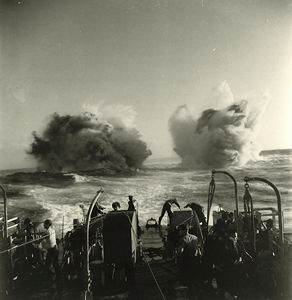Please be advised that Memory Project primary sources may deal with personal testimony that reflect the speaker's recollections and interpretations of events. Individual testimony does not necessarily reflect the views of the Memory Project and Historica Canada.
Transcript
I was terribly seasick, as everybody was who had their first experience of going to sea. And going to sea and becoming seasick for the first time, you’re afraid you’re going to die, then you’re afraid you’re not going to die. But after a day or so, you become acclimatized to the constant motion, and from there on you’re pretty well normal. In the corvettes that Canada had more of, the living quarters are very congested. You don’t realize how cramped they were until you had the experience. When we got close to the northern Ireland coast, the Royal Navy escorts came out, and the convoy was divided up because there would be some ships going to Glasgow [Scotland], some to Liverpool [England], some to Bristol [England] and some perhaps to Southampton [England]. So the convoy was divided up, and the Royal Navy local escort took them to where they were destined to go. Then we waited in Londonderry [England] for four or five days before we started the trip back. Well we were based out of St. John’s, Newfoundland, the same thing would occur on this side of the ocean. The convoy was divided up among the local escort groups that came out from New York and Halifax and Sydney [Nova Scotia] and Boston and escorted their assigned ships to their destination. Then you went through the same thing again, you waited for a few days until a convoy was made up and you started the same thing all over again. We had a scary day out of Halifax the first time I went to sea. It was terribly foggy, a pea soup fog. And the ASDIC [sonar standing for Anti-Submarine Detection Investigation Committee] picked up an echo and of course, action stations were sounded and we took off because you didn’t know what the contact might have been, possibly it could have been a submarine on the surface. But after a few minutes, with a lot of confusion, we were bearing down on a fishing vessel, which if we had collided with it, we would have cut it in two like a knife. However, we veered off and it was just a close call. Many days that were very boring, interspersed with sudden bursts of action that for the most part, had no definite results. Whether there was anything there to be concerned about or not, we never knew. The only other thing that may be of interest was seeing a ship torpedoed off the coast of Ireland. We had left Ireland on our way back and had just picked up our convoy that we were bringing back and was off the coast of Ireland, northern Ireland, within sight of land on a beautiful moonlight night. And of course, the ships were well silhouetted against the sky and I guess the submarine was in among them, and they were successful in torpedoing a tanker that just went up in a big huge ball of flame and disappeared in about four minutes. Other than the survivors that were bobbing around in the sea in their lifejackets with their little blinking lights, witnessing a torpedoing was something that I’ve never forgotten.

 Share on Facebook
Share on Facebook Share on X
Share on X Share by Email
Share by Email Share on Google Classroom
Share on Google Classroom







